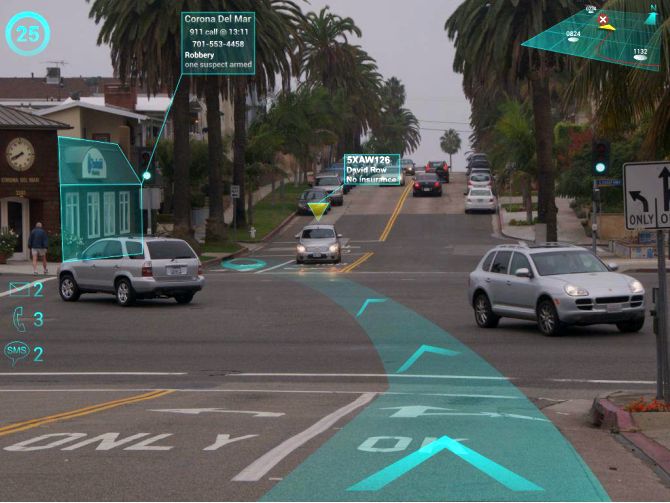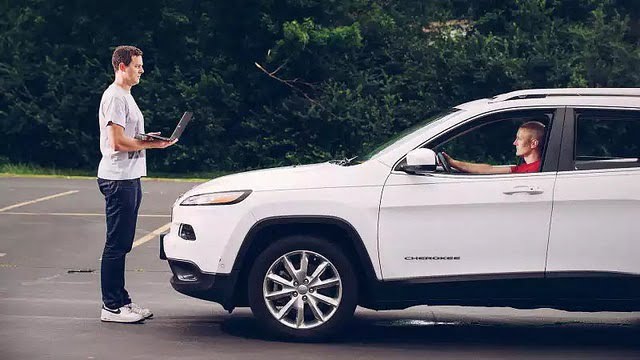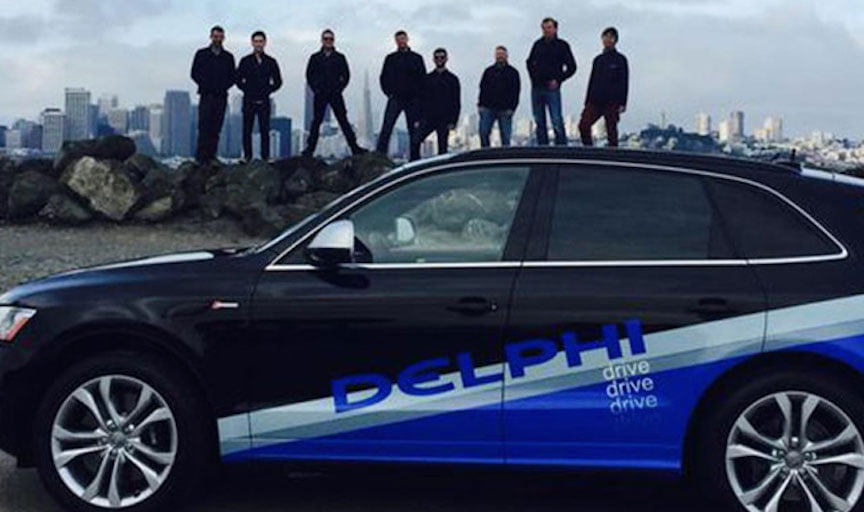When Chrysler recalled 1.4 million vehicles this summer after a dangerous defect was discovered allowing vehicles’ dashboard computers to be hacked, the consequences of creating the connected vehicles of the future became clear. Not only was the system’s navigation system hacked, but a team of WIRED magazine security researchers were able to gain control over the steering, transmission and yes, even the car’s brakes.
In a world where everything from our bank accounts to our cars are protected by a few lines of code, manufacturers need to get smart about their cyber security measures to keep users, and drivers safe. That’s why a number of major auto manufacturers, Chrysler included, have come to appreciate the value of Israeli technology in fending off hackers from every direction – including those that get in the way of our driving.
SEE ALSO: Israeli Company Gearing Up For Driverless Cars
Although Israel is a newcomer to the industry, companies like Argus Cyber Security, Mobileye, and Powermat are driving the automobile industry in a safer and smarter direction.
Cyber security – for cars
Chrysler and other auto makers were reeling when WIRED researchers succeeded in wirelessly hacking the Uconnect dashboard computer in a moving Jeep. Immediately, Chrysler sent out a software update to Jeep owners to prevent similar hacks in the future, as well as initiating “network-level security measures” to block similar attacks over the vehicle’s Internet connection.
While the hack made Americans weary for the future of connected vehicles, the founders of Israeli automotive cyber security startup Argus were hardly moved by the news. To prevent the hacking of vehicles’ Electronic Control Units (ECUs), which control the brakes, engine, steering and airbags, Argus’s patent-pending system scans the communications components to see if anything is awry. Argus’s system does this by analyzing the data that comes in and out of a vehicles’ communications system, which is usually very limited and directed at a specific IP address, making it easy to identify foreign threats or attempts to overhaul a vehicle.
“In a world of connected cars, car-hacking is an unavoidable hazard,” says co-founder and CEO of Argus Ofer Ben-Noon. “Argus helps the automotive industry keep passengers’ safety a top priority and complies with emerging cyber security regulatory requirements.” Of course, like many of the cyber security companies originating in Israel, the idea for Argus’s platform came about while Ben-Noon was serving in the Israeli military’s elite 8200 intelligence unit.
Although Argus isn’t the only Israeli firm trying to protect connected cars- TowerSec and Arilou are two other companies with similar goals in mind- its solution is highly targeted, developed and supported by years of intelligence experience. As Ben-Noon told Forbes, “Our goal is to be the Symantec of automotive security.”
‘Computers on wheels’
When they’re not identifying new ways to keep our cars safe amid imminent online attacks, Israeli companies are hard at work ensuring that the car of the future is way smarter than the one you drive today. Israel’s skilled workforce, strict compliance with international quality standards, and advanced R&D capabilities have helped make the country a leading destination for the outsourcing and development of leading new auto products.
Back in 2010, General Motors (GM) was one of the first companies to recognize the potential in Israel’s development talent, opening an advanced research center in the country that has grown from just 15 engineers to now more than 70. GM also invested $5 million in Israeli startup Powermat that makes wireless charging mats for cell phones and other electronic devices, a much welcomed luxury when on the road.
Sign up for our free weekly newsletter
SubscribeMishor 3D may be the best example of innovative Israeli tech in the automotive space. Last year, Ford tapped the Tel Aviv-based company’s augmented reality navigation technology to be installed in their future models. Mishor’s state-of-the-art tech uses Heads-Up-Display (HUD) to project navigation routes on the dashboard. Ford paid an undisclosed amount to install Mishor’s tech in its vehicles, with the hope that this HUD system will beat out similar systems installed by other major competitors.
According to Uri Pachter, the Director of International Projects, Tenders, and Automotive in Israel, “If you were to ask BMW to name the 10 biggest nations in the automotive industry, Israel wouldn’t likely be included. However, when you talk about adopting and implementing innovative technologies into motor vehicles, it would be almost impossible to take Israel out of the mix,” he tells NoCamels.
Safety first
Although Israel has never had its own successful auto industry (Susita vehicles haven’t been manufactured since the 1980s), engineers in the country know a thing or two about testing the limits of car safety. Seatbelts, airbags and reverse cameras fair pale in comparison to accident alert systems like Mobileye and Brightway Vision, which are working to power a safer future of driverless cars.
Tesla is installing Mobileye’s technology in the latest models of its first partially autonomous electric car, the Model S, which is set to hit the roads by the end of the year, as are Audi and BMW. Mobileye also recently made headlines for powering the longest journey made by an autonomous vehicle, a 3000 mile trip made by the Delphi Roadrunner from San Francisco to New York. And in June, the Taxi and Limousine Commission in New York announced that it will begin installing Mobileye’s alert systems in taxicabs to ensure safer driving. So what’s all the buzz about?
SEE ALSO: Israeli Tech Powers Longest-Ever Driverless Car Journey From San Francisco To Manhattan
Mobileye’s machine vision technology uses a magnifying camera together with software that calculates just how much time a driver needs to brake to prevent collision. The technology, developed by Prof. Amnon Shashua of the Hebrew University, also alerts drivers when they are too close to pedestrians, veering out of their lane, and even hits the brakes for the driver in some vehicles.
Due to the wild success of its technology, as well as the attention Mobileye gained from raising $890 million on the NYSE, a number of major auto manufacturers have already signed agreements to have Mobileye’s Advanced Driver Assistance System preinstalled in their vehicles. BMW, Ford, General Motors, Nissan, Peugot, Volvo, Tesla and even Chrysler are convinced that Mobileye’s tech is the best to keep drivers safe.
Another Israeli tech firm, BrightWay Vision, is building on Mobileye’s momentum by releasing an advanced vision-enhancing technology for night-time driving. BrightWay’s technology makes it possible for drivers to see at night as if they have their high-beams on, without actually turning them on. Synchronized cameras and illuminators make in-coming headlights look like small dots and non-lit areas are illuminated using the technology, called BrightEye’s. Currently, the company is in the process of getting its BrightEye product out on the market, which means appealing to major car manufacturers and dealerships to install the device.
A car battery that charges in five minutes
As the world gears up for autonomous vehicles, electric engines and an overhaul of transportation technology as we know it, Israeli companies are at the forefront of innovation. Just this month, Israeli nano-technology company StoreDot, famous for creating a smartphone battery that can be charged in 30 seconds, received a $18 million investment to develop a car battery that fully charges in five minutes. Once the invention is on the market, it could mean that Israeli tech companies will not only be the brains behind vehicles’ security, safety and smart features, but that may also power the green transportation revolution hopefully lurking around the corner.
Related posts

Editors’ & Readers’ Choice: 10 Favorite NoCamels Articles

Forward Facing: What Does The Future Hold For Israeli High-Tech?

Impact Innovation: Israeli Startups That Could Shape Our Future







Facebook comments